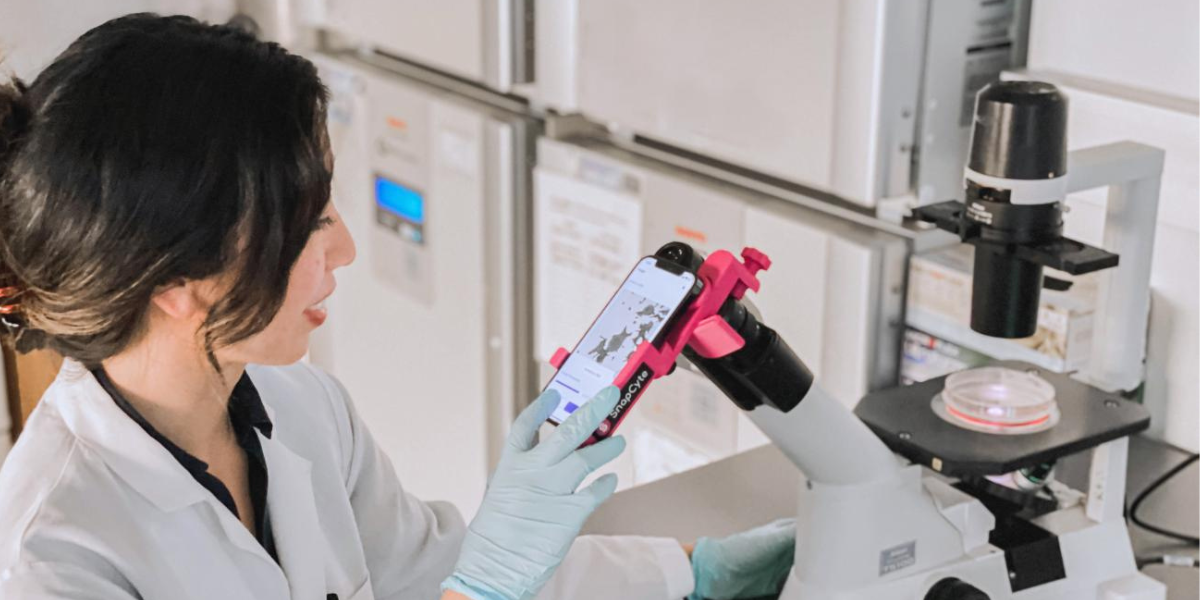
Transformative technology developed at the Vancouver Prostate Centre (VPC) is putting cell analytics into the hands of scientists around the globe. The technology — an artificial intelligence (AI)-driven smartphone app called SnapCyte — produces data for cell growth medical research faster and at a fraction of the cost compared to current technology.
“We developed SnapCyte based on a need for affordable, basic cell analytics that can be accessed by any scientist working in a cell culture or biotechnology laboratory,” says Dr. Mads Daugaard, an associate professor of urologic sciences at UBC and senior research scientist at VPC. “This app makes commercially available affordable, high-performance laboratory technology that can be conveniently accessed on a smartphone.”
Used in the analysis of cancer cells and other diseases at a microscopic scale, the first-of-its-kind smartphone app aims to supercharge the development of novel, personalized medical treatments. Dr. Daugaard and his team at VPC, a Centre of Excellence hosted by UBC and the Vancouver Coastal Health Research Institute, developed the technology based on their own need for fast and accurate cell growth data. Now, they want to bring the breakthrough technology to researchers around the globe.
“The app returns precision data results within five minutes,” he says. “With the former technology, this process would normally take 45 minutes to an hour with the most high-end live-cell imaging and analysis platforms, or 24 hours with colorimetric assays.”

Dr. Mads Daugaard
The researchers say that SnapCyte simplifies workflows without compromising accuracy. Unlike current technology that uses duplicate samples of a cell culture with a medium/serum solution, SnapCyte can be used on experiments in the plates where the cell culture is grown. It also collects and displays cumulative cell data in growth curves to aid with monitoring cell development over time, which can be easily shared among researchers.
“We developed SnapCyte based on a need for affordable, basic cell analytics that can be accessed by any scientist working in a cell culture or biotechnology laboratory..”
Dr. Mads Daugaard
“All you have to do is take the plate with the cell culture out of an incubator for a minute and put it under a microscope where you can then snap a picture of it with your smartphone,” says Dr. Daugaard.
Scientists can also monitor cell growth in the same well or stack of plates continuously, and add nucleic acids or other substances — in a process called transfection — when optimal.
“This platform can be very helpful in drug screening,” says Dr. Daugaard. “When comparing multiple drug candidates, SnapCyte can very accurately and quickly assess how each drug acts on cancer or other cells to identify the most effective treatment.”
Bringing cell analytics within reach of labs across the globe
At a few hundred dollars per year, the app’s affordability makes the platform an accessible option for laboratories that are unable to buy costly cell analytics equipment.
“Many laboratories do not have the funding to purchase new $25,000 to $30,000 machines, or the budget to support the ongoing investment of thousands of dollars per month required to use the equipment,” says Dr. Daugaard.
SnapCyte’s cloud-based platform allows users to not only accurately measure their collective cell culture data in minutes — the big data it gathers could also provide important insights to further advance scientific research.
The app’s AI algorithm is continuously learning from the data received from its users, says Dr. Daugaard. While the data is protected, the app’s efficacy will improve over time as it learns from and shares insights with the research community.
“It is time to democratize research, and that is what we are doing here,” says Dr. Daugaard. “We are putting something on the market for a fraction of the cost that will perform at least as good as — or even better than — many other devices currently available.”
The SnapCyte App is currently undergoing final beta testing and is expected to launch worldwide early next year.
A version of this story originally appeared on the Vancouver Coastal Health Research Institute website.